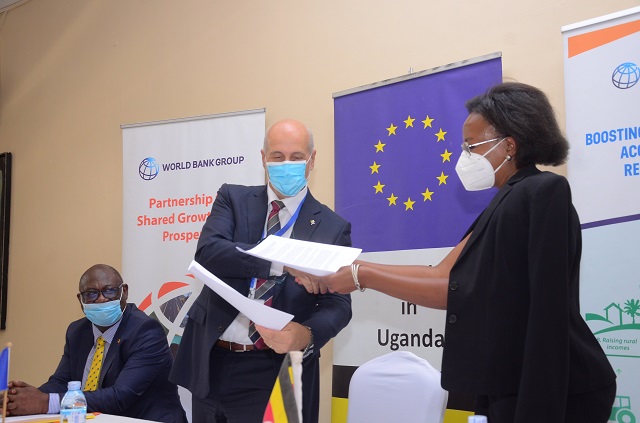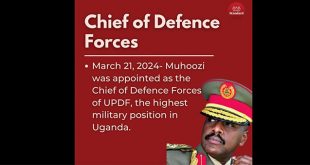
Kampala, Uganda | THE INDEPENDENT | The European Union has provided 8 million euros (31.8 billion shillings) towards efforts aimed at eliminating injustices related to the land tenure systems in the country.
The grant to be administered by the World Bank aims at strengthening land tenure security, land administration and land management systems in northern and eastern Uganda.
The two regions are considered the most affected by land conflicts, with most of them featuring where the customary land tenure system is practiced. Under this system, land is owned communally usually by clans, and in perpetuity.
However, because under this system land is rarely registered, it has been the attraction to illegal transactions where the rich allegedly connive with members of the family or clan to acquire the land, disregarding the customary laws.
Under the Partnership Agreement between the two, the grant will be disbursed over a four-year period through the Multi-Donor Trust Fund (MDTF) that mobilizes donor contributions and invests in strategic areas to promote an effective implementation of Uganda’s national development plans and priorities.
“The EU grant will support both recipient-executed and bank-executed activities that aim at strengthening land administration and management systems, providing land tenure security, and addressing land disputes,” says a joint statement.
World Bank Country Manager for Uganda, Mukami Kariuki says the partnership is needed to support the growth and development of the regions which had also been devastated by the war, but have been again affected by the COVID-19 pandemic.
“This funding will complement activities to modernize and scale up the land administration system in Uganda, currently being supported under the World Bank-funded US$ 200 million Competitiveness and Enterprise Development Project,” says Kariuk.
Uganda has four main land tenure systems, with the other three being Mailo-land, Freehold and Leasehold, with the last two being registered for perpetual ownership and a specified period of ownership respectively.
Mailo land, which is in most cases unregistered, is mainly where big chunks of land were awarded chiefs and collaborators of colonial masters, and the original occupants of the land became tenants of the new landlord.
The different tenure systems, with some common in particular regions, have posed different problems around the country, with conflicts arising between owners and squatters or even between relatives, especially on customary and mailo land. These happen especially as families expand or when a member of a family sells land without the permission of the rest of the ‘co-owners’, among others.
This European Union support will enhance security of land rights by consolidating the demarcation and documentation of individually and communally owned customary lands while ensuring inclusion of vulnerable people of both genders, according to the EU Head of Delegation to Uganda, Attilio Pacifici. He says the land problems Uganda faces are mainly because most of the people depend on agriculture, and yet the population is growing at a high rate.
The financing will strengthen the ability of the Ministry of Lands, Housing and Urban Development to scale up the Systematic Land Adjudication and Certification process for customary lands by automating procedures for issuance of Customary Certificates of Ownership in the two regions.
State Minister for Lands Sam Mayanja says the land conflicts today are a result of the mistakes that were committed between 1886 and 1900 in deals signed between the colonial masters and the local rulers at the time. Mayanja says that since then, various attempts by the subsequent governments to correct the mistakes have not borne fruit as the effects continue growing with population growth and modernization.
He is however hopeful that the grant will boost the current proposed constitutional amendments that seek to introduce a uniform land tenure system which gives documented and perpetual ownership to the land owner.
In a statement read for him by Maris Wanyera, the Permanent Secretary at the Ministry of Finance Ramathan Ggoobi said if Uganda is to transform from a consumer to a commercial economy, it cannot afford to practice the current land systems that cannot even guarantee a ban credit to the owners.
*****
URN
 The Independent Uganda: You get the Truth we Pay the Price
The Independent Uganda: You get the Truth we Pay the Price


